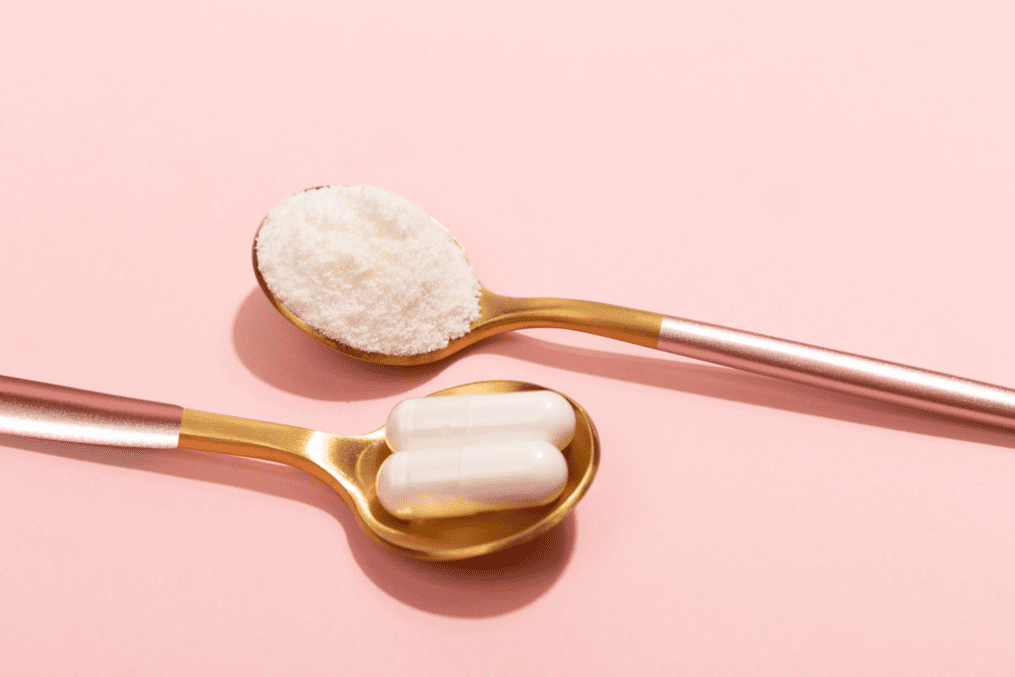What does collagen do?

What is collagen?
A type of protein that knits and holds together your body’s tissues, collagen is found everywhere from bones and tendons to your heart and your hair. And it has been made famous for its role in skin suppleness, firmness and cell renewal, making it something of a wonder ingredient in supplements and skin creams. It’s the most abundant protein in the body, and is synthesised when we break down dietary amino acids from protein-rich foods like dairy, mycoprotein (Quorn) and firm tofu, with a dose of vitamin C needed to help connect the collagen-forming amino acids. And, if you ever wondered why hair gets less glossy and we get a little ‘baggier’ as we age, here’s a piece of the puzzle: collagen production slows after we hit around 25 and takes a further knock after menopause. It’s also affected by exposure to UV rays, pollution and smoking, meaning everything becomes less elastic (and why ‘a hard life’ can show).
What does collagen do?
There are at least 16 types, all helping your connective tissues withstand stretching thanks to its unique structure. Under the microscope, collagen looks like lengths of rope and its ‘fibrils’ – fibres – are incredibly resilient, with one study suggesting that, gram for gram, collagen is stronger than steel. As part of the ‘glue’ that sticks things together then, it gives shape and strength to pretty much every structure in your body, from your corneas to your cartilage. Equally importantly, collagen benefits wound-healing, playing a major part in scar formation. The nutshell is, we’d be leaking blobs without it.
Is collagen suitable for vegetarians and vegans?
Until recently, it was believed that only animal meat could provide a source of collagen, but now vegetarian supplements have been developed, too. Ovoderm is a form of collagen that can be extracted from the membrane of an egg. It has already shown some promising results in scientific research.
Vegan types of collagen also now exist on the market, which are made from genetically modified yeast, or bacterial sources. However, to date there hasn’t been much research done on them.
Any research into collagen?
Despite its importance to our bodies, surprisingly little is out there on the study front… Here’s what we know so far.
Anti-ageing
The first signs of ageing often appear around the eyes, which is annoying. However, one study, which asked 114 women aged 45-65 to take a collagen supplement for eight weeks, saw a marked reduction in the depth of lines around the eye area. In a review of research from Korea, scientists also found that collagen supplements improved skin elasticity in middle-aged women after four weeks’ use, and the same study found women over 50 had improved skin moisture levels. And it’s not just supplements that can help: a small study (they’re all small, sadly) conducted across the pond suggested when creams rich in vitamin A (retinol in this case) were applied to skin, procollagen (the precursor to collagen) production was boosted.
Improves bone and joint health
In one French experiment, scientists saw decreased loss of bone density in subjects who were given a collagen supplement, suggesting it can help keep your skeleton strong. Better still for your scaffold, another study found a daily dose of type I collagen led to reduced pain and inflammation, and increased cartilage in those suffering with osteoarthritis.
Accelerates healing
A 2011 US study looking at skin-graft patients showed that collagen – applied to wounded areas – boosted healing. More recently, collagen-promoting drugs have been developed and show they can improve recovery after corneal surgery – healing the eye in as little as two days.
Hardens nails
Back to beauty, and those of us who crave tasteful talons take heed: a (minuscule) 2017 study of 25 people found those taking a collagen supplement reported 42 per cent less breakage in their nails.
Improves skin
A pilot study into the effects of Ovoderm (vegetarian collagen) on skin health had promising results. After taking 300 mg Ovoderm daily for 50 days, all participants reported an improvement in facial skin softness and 94 per cent reported improved skin hydration. Another pilot study showed a significant improvement in skin elasticity after taking the supplement for five weeks.
How much do I need?
We hate to spoil the good news but, to date, there is still disagreement in science circles as to whether collagen survives the pH roller-coaster encountered in the gut, though anecdotally the evidence seems positive. Finally, when it comes to beauty benefits, all researchers agree collagen molecules are too big to pass through skin, so forget topical products. That said, there appears to be no side effects of taking collagen supplements, though it’s recommended you take them for two to three months to see results.






